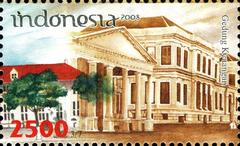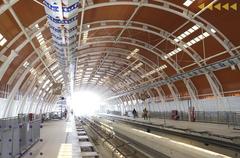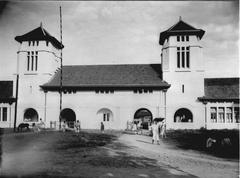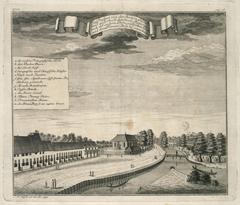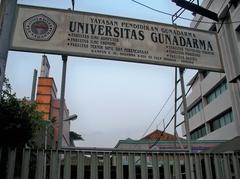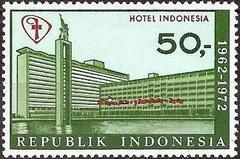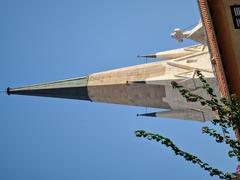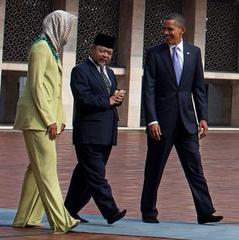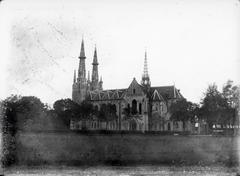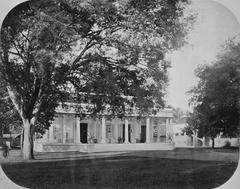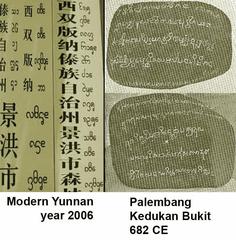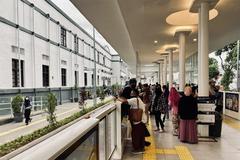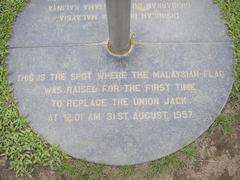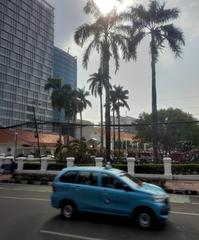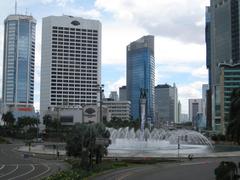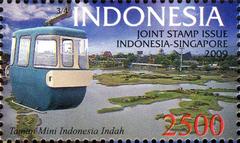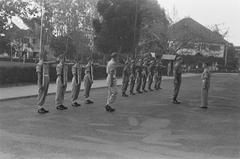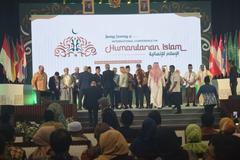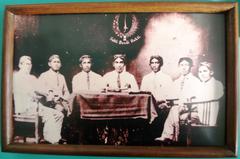Visiting Universitas Islam Jakarta (UID): Complete Guide to Tickets, Hours, and Insider Tips
Date: 04/07/2025
Introduction: UID’s Legacy and Why You Should Visit
Situated in the dynamic heart of Jakarta, Universitas Islam Jakarta (UID) is both an academic powerhouse and a living symbol of Indonesia’s Islamic and national identity. Established shortly after Indonesia’s independence, UID has been a crucial force in shaping the nation’s intellectual, spiritual, and cultural landscape since 1951. Today, UID serves not only as an educational hub for Indonesia’s Muslim-majority population but also as a vibrant destination for visitors interested in Islamic heritage, contemporary Indonesian culture, and Jakarta’s post-independence history (uid.ac.id/sejarah).
UID’s campus in Kramat Raya is well-connected by public transport, making it an accessible and enriching stop for tourists, prospective students, and cultural explorers alike. The university’s distinctive blend of Islamic architecture and modern design, along with its community-focused facilities, ensures a unique and respectful visitor experience. This comprehensive guide provides all the essentials: historical background, visiting hours, ticket and tour details, travel tips, etiquette guidelines, FAQ, and recommendations for nearby attractions (uid.ac.id/sejarah; jakarta-tourism.go.id).
Table of Contents
- UID’s Historical Foundations and Significance
- Motivations and Vision Behind UID’s Establishment
- Campus Development and Role in Indonesia’s Cultural Landscape
- Modern Growth and Educational Philosophy
- Visiting UID: Practical Information
- UID Campus Gate: Architecture, Attractions, and Photographic Spots
- Travel Tips and Accessibility
- Special Events and How to Stay Connected
- Exploring Jakarta: UID’s Proximity to Historical Sites
- Summary and Recommendations
- Official Sources and Useful Links
UID’s Historical Foundations and Significance
UID traces its roots to the Kursus Persiapan Akademi Islam, inaugurated in 1950 to meet the urgent demand for Islamic higher education in post-independence Indonesia. By November 14, 1951, it had evolved into a full university, initially known as Perguruan Tinggi Islam Jakarta. Its establishment was part of a larger national movement to foster intellectual independence, offer accessible education, and cultivate a distinctive Indonesian Islamic identity (uid.ac.id/sejarah).
From humble beginnings—lectures held in local community halls and a first cohort of just 30 students—UID has grown into a reputable institution managed by the Yayasan Wakaf Perguruan Tinggi Islam Jakarta (YWPTID). Its history is intimately tied to Jakarta’s transformation as a center of governance, culture, and religion in the modern era (worldofhistorycheatsheet.com).
Motivations and Vision Behind UID’s Establishment
UID was founded with several core purposes:
- Serving Indonesia’s Muslim Majority: Providing an Islamic academic institution for the world’s largest Muslim population.
- National Pride and Independence: Reducing dependence on foreign education and nurturing a uniquely Indonesian intellectual tradition.
- Accessible Islamic Education: Enabling local students to obtain high-quality Islamic studies without traveling abroad.
- Intellectual Autonomy: Empowering Indonesian scholars to advance national discourse and leadership (uid.ac.id/sejarah).
Campus Development and Role in Indonesia’s Cultural Landscape
UID’s growth parallels Jakarta’s evolution as a cosmopolitan metropolis. Its campus in East Jakarta combines Islamic architectural motifs with contemporary university design, reflecting its mission to harmonize tradition and progress. The university serves a diverse urban community and offers a unique perspective on the integration of faith, learning, and civic responsibility (uii.ac.id).
Modern Growth and Educational Philosophy
Despite early challenges—limited resources, fluctuating enrollments, and political changes—UID has expanded its academic offerings and facilities. The university’s curriculum integrates Islamic and general education, preparing graduates for leadership in both religious and secular spheres. UID’s alumni have become influential figures in education, government, and civil society, furthering its legacy as a catalyst for Indonesia’s development.
Visiting UID: Practical Information
Hours, Entry, and Accessibility
- Visiting Hours: Monday to Friday, 8:00 AM–5:00 PM; Saturday, 8:00 AM–12:00 PM; closed Sundays and public holidays.
- Entry: Admission is free for educational and cultural visits. Register at the main gate for security.
- Accessibility: UID’s main campus (Jl. Balai Rakyat Utan Kayu, East Jakarta) is served by TransJakarta buses, commuter trains, and local taxis. The grounds are largely wheelchair accessible (uid.ac.id/sejarah).
Tickets and Guided Tours
- General Admission: Free.
- Guided Tours: Available by advance request, particularly for groups, academic delegations, or researchers. Contact the international office or public relations department at least two weeks ahead to arrange a tour (UID Journal Portal).
Campus Facilities
- Academic Buildings and Library: Mix of traditional and modern architecture, open to visitors for research (some areas may require prior permission).
- Prayer Rooms (Musholla): Multiple locations on campus, open to all visitors.
- Student Activity Centers and Courtyards: Lively social spaces.
- Cafeterias: Halal Indonesian cuisine (IDR 15,000–40,000 per meal).
- Wi-Fi and ATMs: Free Wi-Fi in public areas; ATMs nearby.
Dining and Refreshments
On-campus cafeterias offer classic Indonesian dishes such as nasi goreng, soto ayam, and gado-gado. The Kramat Raya district around UID has a variety of local restaurants and street food vendors, including vegetarian and international options (HalalTrip).
Safety, Security, and Comfort
- The campus is secure, with staff and CCTV monitoring. Visitors should carry ID and may need to register at the entrance.
- Jakarta’s tropical climate is hot and humid (26–33°C/79–91°F); bring lightweight clothing, stay hydrated, and be prepared for sudden rain, especially October–April (Lonely Planet).
- On-campus medical facilities handle minor needs; hospitals are nearby.
Visitor Protocols and Cultural Etiquette
- Dress Modestly: Men—long trousers, sleeved shirts; women—long skirts or trousers, sleeved tops; headscarves optional for non-Muslim women, appreciated when visiting mosques (Agoda).
- Photography: Permitted outdoors and in public areas, but always ask before photographing people or religious activities.
- Behavior: Greet respectfully; handshakes or hand over the heart are common, especially across genders.
- Prayer Times: Some campus areas may close briefly for daily prayers; visitors may quietly observe.
UID Campus Gate: Architecture, Attractions, and Photographic Spots
The UID Campus Gate (Jl. Balai Rakyat No. 37, Utan Kayu Utara) is a visually striking blend of Islamic motifs and modern design, a popular spot for photography. The adjacent courtyards and student gathering areas are especially photogenic during cultural events and Islamic festivals.
- Visiting Hours: 7:00 AM–5:00 PM, Monday–Friday.
- Entry: Free.
- Accessibility: Wheelchair-friendly pathways and ramps.
Nearby, you’ll find Gedung Kesenian Jakarta (historic arts venue), Jalan Kramat Raya’s bustling markets, and several cultural centers featuring Islamic art and history.
Travel Tips and Accessibility
- Public Transport: Use TransJakarta buses and commuter trains for convenience; taxis and ride-hailing apps are widely available.
- Best Time to Visit: Weekdays during academic sessions offer the most vibrant atmosphere; special events are often held in the evenings or on weekends.
- Cash: Campus vendors typically accept cash; bring IDR for small purchases.
- Connectivity: Free campus Wi-Fi is available, but a local SIM card is recommended for reliable data.
Special Events and How to Stay Connected
UID regularly hosts open lectures, seminars, cultural festivals, and academic conferences. Check the UID events calendar and follow UID’s official social media channels (Facebook, Instagram, YouTube) for updates on upcoming activities.
Exploring Jakarta: UID’s Proximity to Historical Sites
Make the most of your visit by exploring Jakarta’s prominent landmarks nearby:
- Istiqlal Mosque: The largest mosque in Southeast Asia, open to all visitors.
- Jakarta Cathedral: Iconic neo-gothic church, directly across from Istiqlal Mosque.
- National Monument (Monas): Symbol of Indonesia’s independence, with observation deck and museum.
- Museum Nasional: Showcasing Indonesia’s diverse cultural artifacts.
- Kota Tua (Old Town Jakarta): Colonial-era architecture and vibrant markets (jakarta-tourism.go.id).
Frequently Asked Questions (FAQ)
Q: What are UID’s visiting hours?
A: Monday–Friday, 8:00 AM–5:00 PM; Saturday, 8:00 AM–12:00 PM; closed Sundays and holidays.
Q: Is there an entry fee?
A: No, general campus access is free. Special events or tours may require registration.
Q: Are guided tours available?
A: Yes, by advance arrangement through the international office or public relations.
Q: Is the campus accessible for people with disabilities?
A: Yes, most areas are wheelchair accessible.
Q: Can I attend university events as a visitor?
A: Many events are open to the public; check the official website or event calendar.
Q: What public transport serves UID?
A: TransJakarta buses, commuter trains, and local taxis.
Q: What is the best time to visit UID?
A: Weekdays during academic periods and during cultural events or festivals.
Summary of Key Points and Visitor Recommendations
Universitas Islam Jakarta (UID) is a cornerstone of Indonesia’s Islamic academic tradition, offering an inviting blend of cultural heritage, modern educational facilities, and community engagement. Its accessible campus, free admission, and rich calendar of public events make it an ideal destination for cultural tourists, scholars, and anyone interested in Indonesia’s spiritual and intellectual life.
With UID’s strategic location, visitors can easily explore Jakarta’s iconic historical and religious landmarks, broadening their appreciation of the city’s multicultural identity. Respect local customs, dress modestly, plan ahead for guided tours, and consult UID’s website or social media for the latest updates. For added convenience and insider tips, download the Audiala app—your gateway to Islamic educational sites across Indonesia (uid.ac.id/sejarah; jakarta-tourism.go.id; HalalTrip).
Official Sources and Useful Links
- Universitas Islam Jakarta (UID): History and Visitor Information
- Jakarta Islamic University Campus Gate: Hours, Tickets, Travel Tips
- Jakarta Historical Sites – Jakarta Tourism Board
- Lonely Planet Jakarta Guide
- Agoda Jakarta Guide
- HalalTrip Jakarta City Guide
- UID Journal Portal and Events Calendar
For more insights, campus visuals, and guided tour arrangements, visit UID’s official website and follow their social channels. Enhance your trip by exploring related articles on Indonesian Islamic education, Jakarta’s universities, and public transport guides on our platform. Download the Audiala app for real-time updates and virtual tours.
